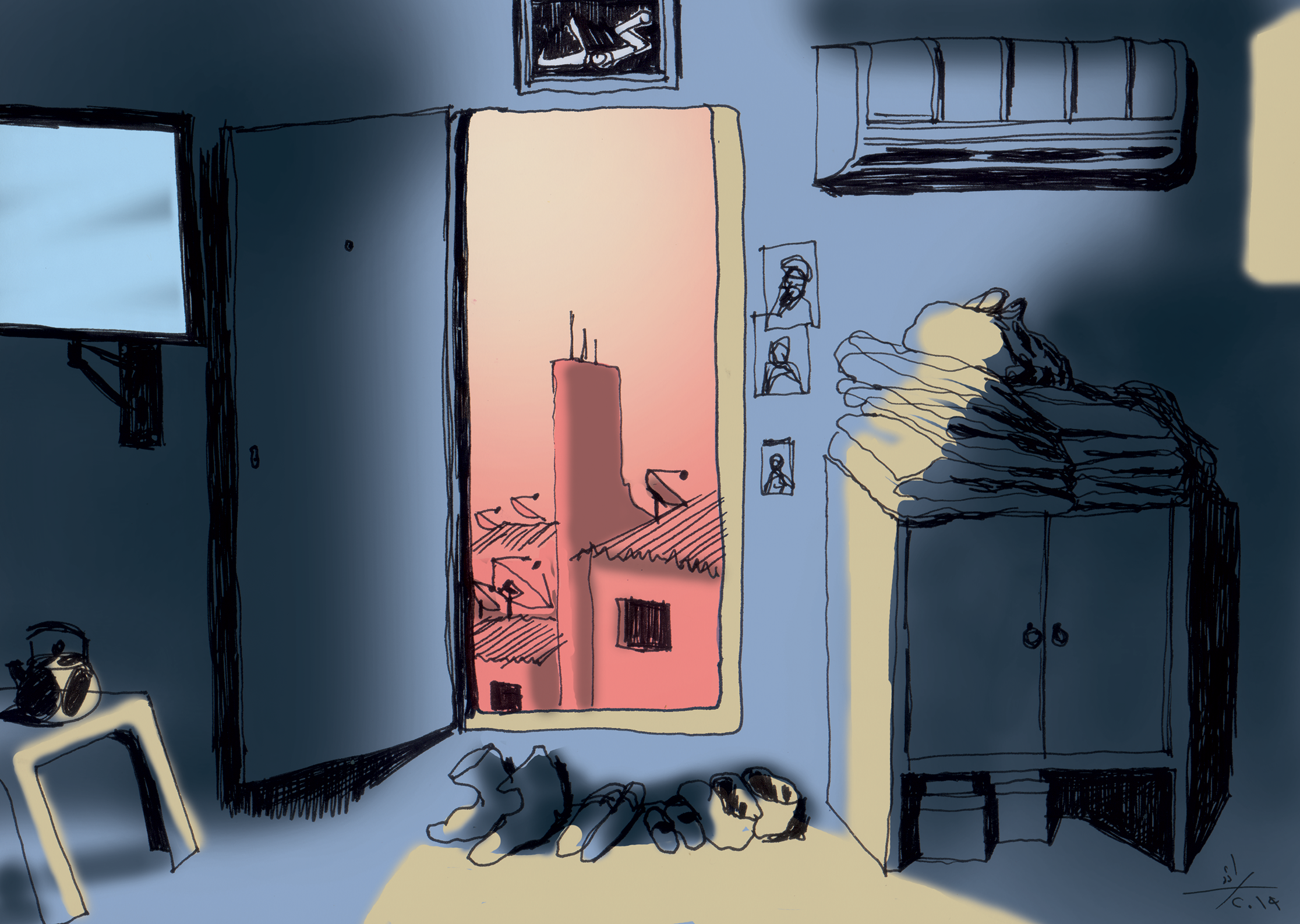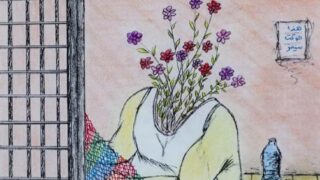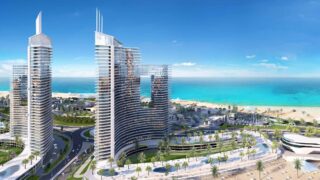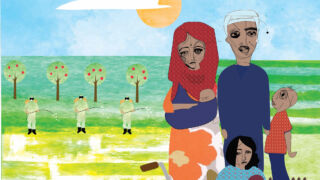
This publication has benefited from the support of the Rosa Luxemburg Foundation. This text may be reproduced in part or in full, provided the source is acknowledged.
The entrance to the slum looks as if it were an attempt to force a way into a well-hidden nest that the authorities have tried hard to keep out of sight, pretending that it does not exist. A high wall encircles the Ring Road preventing drivers and passengers heading to the posh neighborhoods east of Cairo from seeing "the dark side of their capital," which starkly contrasts with the giant billboards along the road advertising the new luxurious cities built by the government and investors. High suspended staircases act as the main entrance and exit to and from the neighborhood, which suggests that fleeing the neighborhood is a process that requires great effort. Beyond those stairs is Al-Munib neighborhood; a slum that lives by its own law, but under the surveillance of the state that treats its inhabitants as subjects on which it tests its brutality.
Standing at the top of the entrance staircase, one can instantly make out the image of a bustling life in the neighborhood. People move around in a constant struggle among themselves and between themselves and the infinite sources of noise attacking their ears and senses. Drivers of dozens of lined-up tuk-tuks (three-wheeled auto-rickshaw vehicles) race to convince potential customers who want to enter the neighborhood to hop on for a ride. Popular songs blast from these tuk-tuks, their music mingling with the calls of the fruit and pickle vendors who use loudspeakers because their voices were not loud enough to draw attention to their goods in the market. These sounds mix with the Quranic verses emanating from a loudspeaker in a nearby Kushari shop. On the wall of a nearby public school, an incomplete verse of poetry says: “People build their glory with knowledge...”, as if the state had deliberately omitted the phrase “and money” from the end of the famous verse by poet Ahmad Shawqi, perhaps out of “concern” for the people’s feelings.
Upper Egypt’s gateway to Cairo
It is difficult to trace the exact origins of Al-Munib. The informal settlement on the southern fringe of the city of Giza began to expand with the increased waves of the migration from rural areas to the outskirts of Cairo from the 1950s onwards. Migration increased during the 1970s with the Egyptian President Anwar Sadat's openness policy. Al-Munib became Upper Egypt’s gateway into Cairo, as it constitutes a focal point for people from southern and central Egypt who come to the capital in search of work due to the decline in agricultural incomes and the deterioration of services in the villages.
A number of the neighborhood’s residents, especially those who have arrived in the last decade, still keep their identity cards bearing their previous addresses in Upper Egypt. Despite the obviously high number of residents, there are no official figures regarding their census. The numbers published by the authorities only disclose the total number of residents in the districts, without mentioning small neighborhoods and gatherings. In its last census in September 2017, the Central Agency for Public Mobilization and Statistics stated that the population of the Giza district, to which Al-Munib neighborhood belongs, was more than 285,000 citizens.
Architectural designs for the urban cities drawn up by the state or professional architects have not yet reached the area. It is, perhaps, because Al-Munib has not yet experienced a catastrophe forcing the state to develop it, as happened in the Al-Dweikah neighborhood in Jabal al-Muqattam. In cafés, people talk about the stories of the densely populated areas that the state is demolishing, such as Bulaq and Majra al-Ayun, and moving their people to dwellings in the desert under the pretext of development. The people thank God that their neighborhood is not of such strategic importance that the state would want to take over it.
A high wall encircles the Ring Road preventing drivers and passengers heading to the posh neighborhoods east of Cairo from seeing "the dark side of their capital," which starkly contrasts with the giant billboards along the road advertising the new luxurious cities built by the government and investors.
Considering the difficult-to-catastrophic living conditions of the neighborhood residents, the contractors designed some floors as separate rooms with small bathrooms inside so that the poorest families or individual migrants could find accommodation in the neighborhood.
The neighborhood was built by generations of contractors who came from Upper Egypt over the past few decades, after having sold their lands to finance their new businesses. The construction process has taken place mostly through partnerships with landowners. Per the agreement, the contractor bears the overall construction costs provided that he shares with the landowner the money for the sold apartments. Those contractors, who know nothing about the rules of modern architecture, understand very well how to make use of every meter to accommodate the considerable number of residents and migrants who flock to Al-Munib every day.
The contractors have designed the neighborhood as a line-up of tall buildings with small apartments separated by thin walls on either side of narrow lanes that the sun can’t touch. This design translates into a labyrinth of alleyways that visitors and outsiders would find difficult to find their way around. Realizing the futility of balconies in the buildings overlooking these alleyways, the contractors took advantage of the spaces of balconies to increase the area of the apartments by an additional meter, which further narrows these slender lanes. Considering the difficult-to-catastrophic living conditions of the neighborhood’s residents, the contractors designed some floors as separate rooms with small bathrooms inside so that the poorest families or solo migrants could find accommodation in the neighborhood.
With the deterioration of their living conditions, some families who have owned apartments in this neighborhood for decades had to build walls to separate specific rooms and offer them for rent for additional income. Since the 1970s, the available space for the people who find it difficult to leave this poor neighborhood has decreased with the continuous increase in the population. This situation led to an attempt to adapt to the smallest of spaces. Rabie Sayed, who came from Bani Suef Governorate, said that he lived with his wife and three children in an apartment of no more than 40 square meters, consisting of two small rooms and a bathroom.
These narrow spaces and adjoining rooms are designed to hold as many people as possible, but they take away the privacy of their residents. In the neighborhood’s cafés, young people naughtily tell each other about the voices they heard the previous night of their neighbors' intimate routine. Summer, on the other hand, deepens this invasion of privacy, with people leaving their windows open and sitting around in light clothing, while their voyeuristic neighbors take this opportunity as an invitation to pass time on long boring days. Young men might also dare to make conversation with women, and feelings of jealousy might arise leading to street fights in which firearms appear, often resulting in killing or injuring some people.
Who are they?
Demographically, the Al-Munib community includes a heterogeneous residential group formed by successive migrations that occurred over many decades. Most migrants are males who come from various southern governorates wherein one’s birthplace is very important in defining one’s belonging to specific groups and tribes within the neighborhood. It is a protective belonging in a society whose groups continuously struggle for power, where the new migrant is dealt with as “an outsider”. This outsider must quickly prove his compliance with the law of the new area in which he resides. He must also establish personal ties with the powerful and prestigious in the neighborhood, be they people of great stature or thugs. They would provide him with a relative protection from any crime or assault, especially theft, as the houses are largely unprotected in the neighborhood. The cafes scattered at most of the main exits of the streets are an escape from the daily boredom experienced by migrants and neighborhood men alike. They constitute a significant factor in cementing ties and building friendships that protect migrants in a society which is as intertwined and complex as its streets and alleyways.
The community of Al-Munib includes a heterogeneous residential group formed through migration over many decades. Most migrants are males who come from various southern governorates wherein one’s birthplace is very important in defining one’s belonging to specific groups and tribes within the neighborhood. It is a protective belonging in a society whose groups continuously struggle for power, where the new migrant is dealt with as “an outsider”.
Due to the deterioration in utility services, the residents have established a solidarity system based primarily on collecting money from each other to fill these gaps and compensate for the state's absence. For instance, they agreed with the garbage collectors in Manshiyat Nasir to come and collect garbage in return for sums that the residents themselves have raised through monthly payments. There is no street lighting either, so they collect money to buy light bulbs.
Heads of families are often suspicious and wary of single male migrants, especially those who work half a day and drift aimlessly for the rest of their time. Some families are suspicious that it might lead some young migrants to go out in search for romantic relationships with the women of their neighborhood. In May 2018, a father killed his 17-year-old daughter in Al-Munib after seeing her strolling with a strange young man near their residential area.
Overcoming the absence of the state and its services
For the past two months, women in the southern neighborhood have been going out to sit in front of their homes every afternoon. Their image from afar may look rosy, as they seem to be having a friendly chat about the neighborhood’s conditions, telling stories, gossiping, or complaining about rising prices. But they are actually there in this particular time by force, not by choice, as the electric power is out for two hours during this time of day. The women say that power outages are not their only problem. The water is also out for hours throughout the day, forcing them to constantly fill plastic containers to store water. Anger washes over the women's faces when they hear the word "drainage," as the pipes are constantly clogged, leading to their overflowing and forcing the residents to intervene to solve the crisis. For years, they have heard all sorts of promises from successive officials and MPs about developing the neighborhood and paving its roads. However, nowhere have they seen this development yet, and these promises have become boring reiterations that surprise no one. On the contrary, they sometimes provoke ridicule and laughter.
Despite the state's strictness in collecting bills in this neighborhood and others, which has become a major resource for the public budget, services are constantly deteriorating amid the reluctance of “district officials” (a local administration appointed by the state, which plays the role of the municipality in monitoring public order and services) to solve them quickly. In 2016, electricity bill collectors faced threats from shopkeepers in Al-Munib following the back-to-back increases.
Due to the deterioration of some services, the residents have established a solidarity system based primarily on collecting money from each other to fill these gaps and compensate for the state's absence. Four years ago, the residents agreed with the garbage collectors in the Manshiyat Nasir neighborhood to come and collect the garbage in return for sums that the residents contribute to paying monthly. There is no street lighting either, so they collect money to buy light bulbs. A parent, who has a spacious apartment, volunteers to receive private tutors at his home during classes for some neighborhood children.
The migrants also developed a solidarity system of another sort, based on the regions they come from, to obtain housing or work. An immigrant comes to the neighborhood to stay with other immigrants from his hometown. They provide him with work, either with them or with their friends. Where they come from affects the job market in the neighborhood; for example, immigrants from each of the southern governorates are famous for taking up specific professions.
The state's lack of interest in these slum areas is due to its realization that they do not pose a political threat to the ruling authority. The anger of these residents is directed against each other, not against the government. The people of Al-Munib rarely protest against the government. But even when they do, it is for categorical demands that do not have a political nature, such as demanding better utility services or objecting to fuel shortages for several days.
An electoral gold mine
In Al-Munib, one can find expressions that repeat the rhetoric of Ahmad Musa, a talk show television host who is known for his fierce defense of the regime. His massive promotion of "the regime's economic reforms" and what he describes as the "ruin that the January Revolution has caused" is echoed in the media, whose voice has become one with the government.
In cafes, many people express their faith in the plans and achievements of President El-Sissi and the bright future awaiting coming generations. Despite acknowledging the deterioration of their financial conditions, those people justify the high prices saying it’s their share of the bill that everyone must pay to create the economic boom sought by the regime. In fact, it is the discourse propagated by the media.
Throughout various eras, the residents of Al-Munib have remained an easily-exploited electoral gold mine for every political authority. With ears wide open, they receive the promises made by the successive regimes with nothing but faith. Poverty was an important mobilizing tool for the existing political system and its opponents, particularly the Muslim Brotherhood, which was able to establish a coherent social and medical assistance system.
The state's lack of interest in these slum areas is due to its realization that they do not pose a political threat to the ruling authority. The anger of these residents is usually directed against one another, not against the government. The people of Al-Munib rarely protest against the government. But when they do, it is for categorical demands that do not have a political nature.
During the January revolution, Al-Munib was the last hope of some of the Mubarak regime's well-known officials to confront the hordes of angry revolutionaries who refused to leave Tahrir Square. The thugs of the neighborhood (known as “Baltagiyyah”) had been a powerful tool used for the intimidation of the rivals of Mubarak's party during the pre-revolution elections, and an effective mobilizing power during any elections in the neighborhood (as in the neighboring Nazlat al-Samman). The officials, hence, entrusted them with a fateful task. They were asked to go on camels and horses, bearing cold weapons (knives and machetes) to intimidate and disperse the demonstrators on the morning of 2 February 2011, in the attack which was dubbed the "Battle of the Camel." The mission failed, and Mubarak's regime fell into a new dilemma that accelerated the President’s deposition only nine days later.
However, some of the residents saw a glimmer of hope very early on. They took part in setting Al-Munib’s police station on fire on the eve of the revolutionary upheaval on 28 January 2011. They also organized several small protests demanding reforms to their conditions in the following period. However, they soon felt betrayed by the revolutionary and Islamic elite that saw their demands as a driving force for their movement that did not deserve to be a priority.
Indeed, some of their protest methods, such as setting up roadblocks as a means of pressure to improve their conditions, were considered as a form of thuggery.
Moreover, El-Sissi did not think of new creative methods that could attract the slum’s residents to vote. He just played on the string of poverty by offering sums of money and in-kind assistance to everyone who voted. He also relied on compulsory voter mobilization. According to testimonies of residents, police and thugs roamed some houses during the constitutional amendments last April to force people to go to the polls.
Misery exacerbated by unemployment
Due to large numbers of job-seekers, work opportunities have become rare. Amid widespread poverty and a closed horizon, young people in the neighborhood are trying, without much success, to find a job that provides a daily income that meets their needs or helps meet the needs of their families. The unemployment and insufficient income constrain young people, as even those close to the age of thirty still live in their parents' homes without being able to get private accommodation or marry.
The lack of job opportunities, however, has stirred the creativity of some residents who devised simple ways to get their daily bread. Some young people go out in small carts to sell hot “Indomie” instant noodles to schoolchildren. Others set up glass vitrines in the street to sell liver sandwiches, while some buy tuk-tuk rickshaws and work as transportation drivers, with the absence of other means of transportation within the neighborhood. Some government employees with low salaries work as tuk-tuk drivers to make additional income for their families and buy furniture for their daughters' marriages. Any new profession that succeeds in Al-Munib encourages others to practice it widely, and tuk-tuks are a clear example. They have become so many in the neighborhood's narrow streets that they outnumber commuters.
The thugs of the neighborhood had been a powerful tool for the intimidation of the rivals of Mubarak's party during the pre-revolution elections. They were asked to go on camels and horses, bearing cold weapons (knives and machetes) to intimidate and disperse the demonstrators on the morning of 2 February 2011, in the attack dubbed “The Battle of the Camel." The mission failed, and Mubarak's regime fell into a new dilemma.
Unemployment has many ugly faces, as some young people tend to make a comfortable income away from hardship and "the humiliation of work for others" by distributing drugs on street corners and vital areas during the night. Despite being a dangerous trade, those young people think they can practice with simple precautions. For example, they can monitor the side streets by appointing a watchdog to report the arrival of the police; cover their back by wooing big thugs; and reduce work during the final few months of the year which witness intense security crackdowns. Everything could go smoothly, and the dealer could end the night collecting hundreds of pounds, an amount he wouldn't earn while working for a week in any other legitimate profession. Thanks to the sale of cannabis, tramadol, and even sex-enhancing pills, Al-Munib has become a popular area for the drug trade.
At the tuk-tuk parking lot, which is at the entrance to the neighborhood and near the police station, anyone could point you, without hesitation, to the drug dispenser who operates almost openly in the absence of police. Social media pages have circulated videos in this regard, including a video of a drug dispenser for whom buyers compete fiercely to get what their fix before he runs out of goods.
Other young people have turned to bullying, thuggery, and pickpocketing to earn a living. Becoming a source of terror for the people, motorcyclists wait for the moment they see a phone in someone's ear or a bag in the hands of a woman to grab it and disappear in a jiffy.
Due to rampant unemployment, stressful lifestyles, and the difficulty of getting married, Al-Munib has made the news headlines as a hub for crime, murder, and rape. Newspapers have reported the following incidents: Three tuk-tuk drivers raped a hospital worker in Al-Munib in March 2018; thugs did not show mercy to the pleas of a pregnant woman who was raped last December after her husband was forced to stop his car and beaten; 12 “human monsters” took turn raping a girl in the neighborhood in 2013. The newspapers reported that they “coldly” gave their testimonies to the prosecution, saying that they did not regret what they did.
Thugs and security management
These incidents are what junior thugs do. However, senior thugs enjoy the respect - and fear - of the neighborhood’s inhabitants. People turn to them to solve petty problems such as financial disputes or small quarrels between two families. Over time, these thugs have fostered strong bonds with MPs, with the power to mobilize votes and intimidate rivals. These connections have earned them a distinguished social standing.
The police are also comfortable with the presence of the “big thugs” who are able to control junior thugs and facilitate the arrest of wanted men. In Al-Munib, police can find and arrest perpetrators in record time, thanks to those powerful thugs to whom the police assign some minor roles, according to an inherited social contract. The thugs become the police’s watchful eye in a neighborhood that needs large numbers of unavailable security men in exchange for social influence and the police’s leniency with part of their illegal activity. After ousting late President Muhammad Mursi in 2013, these thugs helped the police go after members of the Muslim Brotherhood and those close to them.
Some people turn to the imams of mosques to seek reconciliation and solve other problems. However, their role remains marginal, as the escalation of violence in people disputes leads to the exclusion of the sheikhs as mediators and the dependence more on powerful thugs.
Absence of police and fear of them
Police's reliance on thugs and residents in settling their minor disputes can be seen in the noticeable absence of its men on the streets of Al-Munib. As long as people's disputes do not amount to a high level of threat or constitute an infringement on the powers of the security forces, the reliance would continue.
Nevertheless, the police never forget to impose their authority by excessive force and extralegal means so that the residents will feel that the police have the ultimate power and should be feared. With occasional violent inspection crackdowns, arbitrary arrests of suspects, and constant accusations and insults, the police focus on constantly reminding families of how vulnerable they are to its authority.
In November 2012, young Saad Saeed was tortured to death in a police station where he was detained after he quarreled with some thugs who attacked his residential area. The people’s testimonies about this incident reveal how the police deal with the citizens. The police personnel dragged and violently beat Saad with the heels of weapons and sticks in front of the neighborhood people to humiliate him. Then, they severely tortured him, accusing him of a ready-made trumped-up charge of possessing a cold weapon. Moreover, when the victim passed away, a short phone call to his family was sufficient to inform them of his death.
Police officers are well aware that they are rarely prosecuted for their transgressions. And if any, they will have reduced sentences. The death of Saad Saeed is proof of that. The court condemned the police officers involved in the crime five years later and only sentenced the chief officer to five years in prison. On the other hand, if the attack were on the police, they would not think twice. They would have arrested every available suspect without discrimination. Then the prosecution and the court would have intervened to complete the task by inflicting severe penalties on the accused.
Police can arrest perpetrators in record time in Al-Munib, thanks to those powerful thugs to whom the police assign some minor roles, according to a social contract. The thugs become the police’s watchful eye in a neighborhood that needs large numbers of unavailable security men in exchange for social influence and the police’s leniency with part of their illegal activity.
Police do not forget to impose their authority by excessive force and extralegal means so that the residents will feel that the police have the ultimate power and should be feared. With occasional violent inspection crackdowns, arbitrary arrests of suspects, and constant accusations and insults, the police focus on constantly reminding families of how vulnerable they are to its authority.
With police brutality opposite a vulnerable population, many are trying to find creative ways to escape harassment. Showing pro-regime political affiliation in the neighborhood has become a way for some to circumvent this security grip. It is enough to hang a picture of President El-Sissi in military uniform at the entrance to your house or inside your car to be spared some harassment. One of the defendants in the case of the burning of Al-Munib police station, which took place in January 2015, realized that. During the trial, he wore a shirt which read, “Long live Egypt, long live President El-Sissi, the army, the police, and the judiciary of Egypt.” This phrase alone was enough wiggle him out of a strict 10-year prison sentence. So he was retried, unlike his peers in the same case who got a 10-year sentence.
The Slums of Algeria: Invisibility and Hope
18-05-2022
Invisible Slums: “Al-Ghaba” in Tunisia’s Sfax
01-06-2022
The demands made by the people of Al-Munib were never radical; they only demanded simple services and jobs that bring sufficient income. They have never dreamed of a great future. Perhaps these demands are no longer put forward as vigorously as before and during the years following the January revolution. In fact, the people of Al-Munib now hope that the state would continue to forget about them, because every intervention by the state over the years has turned into a burden rather than a means to organize their lives and solve their problems.
The content of this publication is the sole responsibility of Assafir Al-Arabi and Rosa Luxemburg Foundation cannot accept any liability for it.
Translated from Arabic by Sabry Zaki
Published in Assafir Al-Arabi on 14/11/2019





